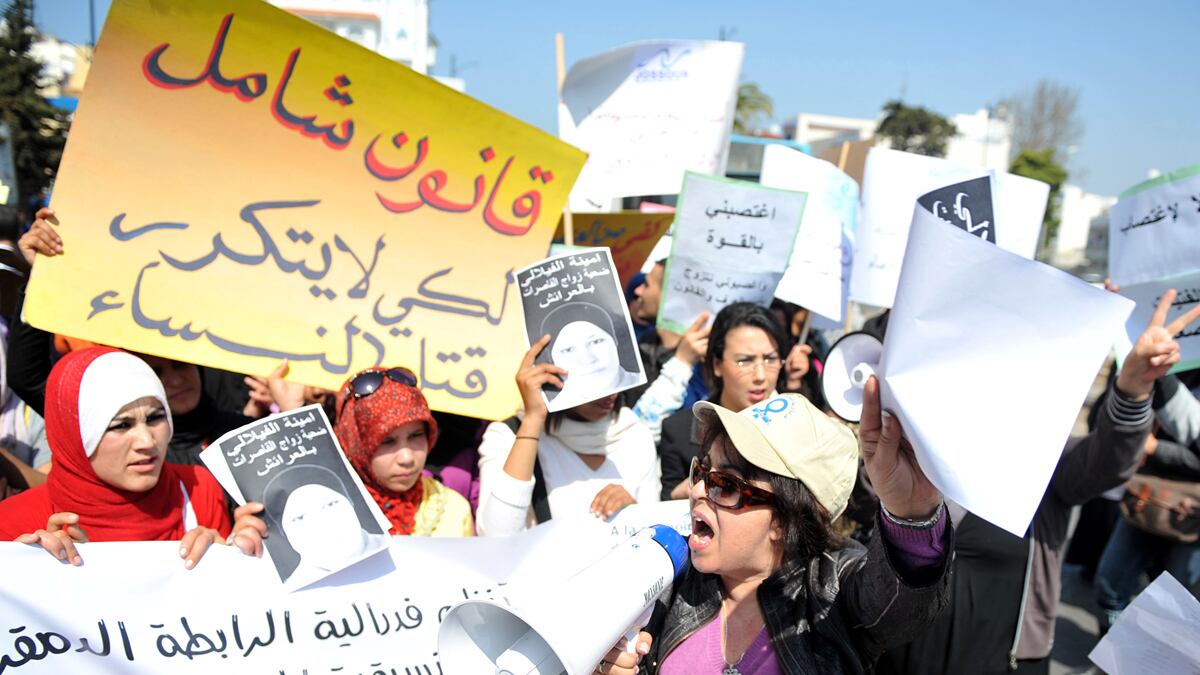“Moroccan Girl Kills Herself After Judge Forces Her To Marry Her Rapist.” This horrific headline, or some version of it, spread from Twitter to traditional news outlets around the world earlier this week. Using the hashtag #RIPAmina, people voiced their outrage and disbelief, and called for a reform of Article 475 of the Moroccan penal code, which was said to enable rapists. But preventing this tragedy from happening again isn’t simply a matter of legal reform. It’s a matter of how cases of rape are handled by Moroccan society at large.
The death of Amina Filali was reported on the front page of Al Massae, Morocco’s largest newspaper. Though some details have been disputed, the facts themselves are sadly straightforward. Amina, a 16-year-old girl from the northern city of Larache, was abducted at knifepoint and raped sometime last year. Her family went to the public prosecutor’s office in Tangier to press charges against the alleged rapist, a 26-year old laborer named Mustafa F. Friends of the family intervened, however, and suggested an “amicable solution”: marrying the girl to the rapist.
Because Amina was legally a minor, a family judge was called upon to review the petition for marriage—a petition he approved. A few months ago, Amina went to live with her husband’s family, who reportedly treated her poorly. She told her mother that she was being repeatedly beaten. After another vicious fight, she committed suicide by drinking rat poison. She died in a hospital in Larache last week.
Under Moroccan law, rape is punished by prison sentences of five to 30 years, depending on a range of aggravating circumstances, including the age of the victim. Had the law been applied properly in this case, Mustafa F. would have been charged with “rape of a minor under the age of 18” and, if convicted, would have been sentenced to 10 to 20 years in prison. The public prosecutor failed Amina when he or she did not immediately proceed with an arrest and an investigation.

Another, more terrible failure is that the family agreed to the “amicable solution” offered by their friends. Rape is a crime in Morocco, but it is also a taboo. The woman who has been raped is often seen as having been shamed—her marriage prospects change radically, and her morals are called into question. In other words, the victim is blamed and the perpetrator is forgotten. “If we married her off,” Amina’s sister Hamida told a Spanish network, “it was to protect her, so that people would not speak ill of her.” The Filali family apparently preferred to sacrifice their daughter’s physical and emotional well-being rather than live with the reminder that she had been raped.
And then there is Article 475 of the penal code, which was the focus of so much discussion online. Contrary to what has been reported, this law does not apply to violent crimes, such as rape. Article 475 states that when an adult corrupts a minor without the use of violence, threat, or fraud, the sentence is five years of imprisonment, whether or not there has been sexual intercourse; further, if the minor has married the adult, then the adult can only be tried if the minor’s legal guardians press charges and obtain an annulment. It was this loophole that the family used in order to marry off their daughter, close the case, and wash the shame.
For many years, Moroccan feminist organizations, such as the Democratic League of Women’s Rights, have been demanding that Article 475 be abrogated. After Al Massae’s report on Amina Filali, Moroccans took to Twitter to express their outrage. They started a petition and a Facebook page asking that this law be repealed. It should. Without it, the case would never have reached the desk of the family judge—another person who failed Amina. This judge, presumably in full awareness of the facts, agreed to the marriage petition. It is telling that while Amina Filali’s name has been made public, the judge who forced her to marry her rapist has neither been named nor shamed.
But abrogating Article 475 is only the beginning, not the end of the battle for justice, because the truth is that all of us Moroccans have failed Amina. Her case, though particularly horrific, is not unique. People still prefer to keep silent about rape, to act as if it hadn’t happened, to blame the woman who was the victim, to open a debate about her morals, or to find an “amicable solution” for the perpetrator. Legal reforms are not enough so long as Moroccan society views the victim of a rape as something that needs to be solved. Rape is not puzzle. Rape is a crime. Amina Filali’s death is a stain on our collective conscience.





